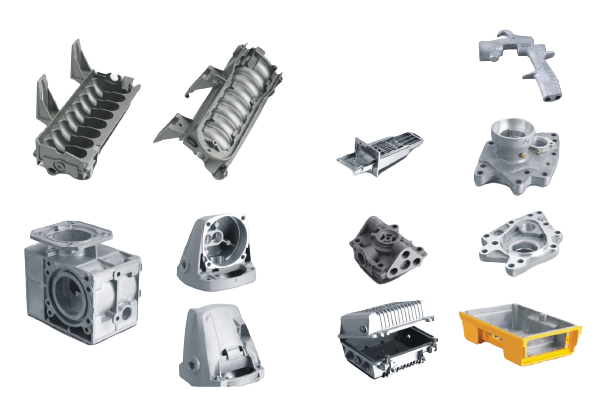A Biased View of Alcast Company
A Biased View of Alcast Company
Blog Article
What Does Alcast Company Do?
Table of ContentsThe Basic Principles Of Alcast Company Things about Alcast Company6 Easy Facts About Alcast Company ShownAbout Alcast CompanyThe Main Principles Of Alcast Company Unknown Facts About Alcast Company
The refined distinction hinges on the chemical content. Chemical Comparison of Cast Light weight aluminum Alloys Silicon promotes castability by decreasing the alloy's melting temperature and enhancing fluidness throughout casting. It plays a crucial role in enabling elaborate mold and mildews to be filled up accurately. Additionally, silicon contributes to the alloy's stamina and use resistance, making it beneficial in applications where longevity is vital, such as auto components and engine parts.It likewise improves the machinability of the alloy, making it simpler to refine into finished items. By doing this, iron adds to the overall workability of aluminum alloys. Copper raises electric conductivity, making it helpful in electric applications. It also enhances deterioration resistance and contributes to the alloy's total strength.
Manganese contributes to the strength of aluminum alloys and improves workability (aluminum casting manufacturer). It is frequently made use of in functioned aluminum products like sheets, extrusions, and profiles. The presence of manganese aids in the alloy's formability and resistance to fracturing during manufacture processes. Magnesium is a light-weight aspect that offers strength and influence resistance to light weight aluminum alloys.
The Greatest Guide To Alcast Company
Zinc improves the castability of light weight aluminum alloys and assists control the solidification procedure during casting. It boosts the alloy's strength and hardness.

The key thermal conductivity, tensile toughness, yield strength, and elongation differ. Select suitable raw products according to the efficiency of the target product generated. Among the above alloys, A356 has the highest possible thermal conductivity, and A380 and ADC12 have the least expensive. The tensile restriction is the contrary. A360 has the most effective yield toughness and the greatest elongation rate.
The 45-Second Trick For Alcast Company

In accuracy casting, 6063 is fit for applications where detailed geometries and high-quality surface area finishes are critical. Examples consist of telecommunication enclosures, where the alloy's premium formability permits sleek and aesthetically pleasing styles while preserving architectural stability. In the Lights Solutions industry, precision-cast 6063 elements create stylish and effective lights components that require elaborate forms and great thermal efficiency.
It brings about a better surface area finish and far better corrosion resistance in A360. Furthermore, the A360 shows premium prolongation, making it optimal for complex check my reference and thin-walled components. In accuracy spreading applications, A360 is appropriate for markets such as Consumer Electronics, Telecommunication, and Power Devices. Its improved fluidity allows for intricate, high-precision components like mobile phone cases and communication device housings.
Alcast Company - An Overview
Its special residential or commercial properties make A360 an important selection for accuracy spreading in these markets, improving item longevity and top quality. Light weight aluminum alloy 380, or A380, is an extensively made use of spreading alloy with a number of distinctive features. It offers exceptional castability, making it an ideal choice for precision casting. A380 exhibits excellent fluidity when molten, making sure elaborate and in-depth molds are properly reproduced.
In precision casting, aluminum 413 radiates in the Customer Electronic Devices and Power Equipment markets. This alloy's superior corrosion resistance makes it an outstanding selection for outside applications, making sure resilient, resilient items in the mentioned markets.
The Single Strategy To Use For Alcast Company
When you have decided that the light weight aluminum die casting procedure is suitable for your job, a crucial following step is selecting the most appropriate alloy. The light weight aluminum alloy you choose will significantly influence both the casting process and the homes of the last product. As a result of this, you need to make your decision very carefully and take an informed approach.
Figuring out the most suitable light weight aluminum alloy for your application will mean weighing a wide variety of features. The initial classification addresses alloy features that impact the production process.
Not known Incorrect Statements About Alcast Company
The alloy you select for die spreading directly influences a number of facets of the spreading procedure, like just how easy the alloy is to collaborate with and if it is vulnerable to casting flaws. Hot cracking, additionally understood as solidification fracturing, is a typical die casting defect for light weight aluminum alloys that can cause interior or surface-level splits or fractures.
Specific aluminum alloys are much more prone to warm cracking than others, and your choice should consider this. One more typical issue located in the die spreading of light weight aluminum is die soldering, which is when the actors adheres to the die wall surfaces and makes ejection tough. It can damage both the actors and the die, so you must try to find alloys with high anti-soldering residential properties.
Rust resistance, which is already a significant attribute of light weight aluminum, can differ considerably from alloy to alloy and is a necessary particular to consider depending upon the environmental conditions your product will certainly be exposed to (aluminum casting company). Put on resistance is another property frequently sought in light weight aluminum items and can distinguish some alloys
Report this page